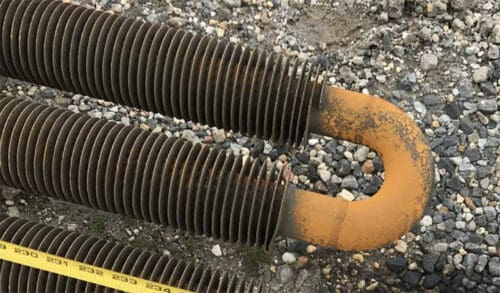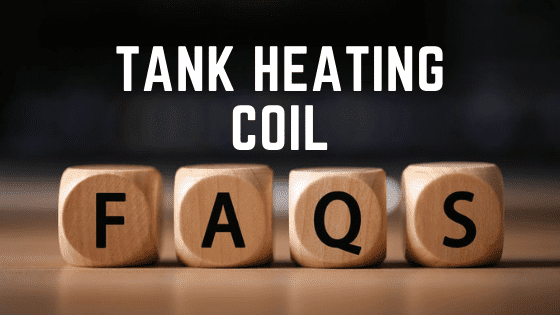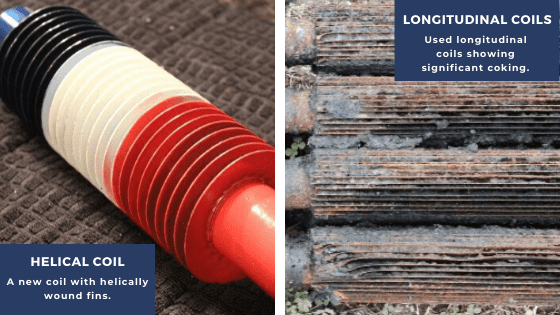Curious about tank heating coils? You’re in luck. With decades of experience, we’ve compiled a comprehensive list of the most commonly asked customer questions regarding steam and thermal oil tank heating coils.
What’s the difference between helical and longitudinal tank coils?
Helical tank coils feature coils wrapped vertically around the pipe, whereas longitudinal tank coils have fins running along the length of the pipe. You can see the difference between these two styles in the photo below. Learn more about helically wound tank coils vs. longitudinal tank coils here.
Are helical or longitudinal fins the better option when it comes to tank coils?

A tank coil with a helical wound fin after decades of use. Proof that fouling does not occur when using the right fin and operating the tank coils the right way!
Helically wound tank coils offer numerous advantages, including:
Enhanced heat transfer: Finned tank coils with helically wound fins boast nearly double the heat transfer rate compared to those with longitudinal fins.
Cost reduction: Tank coils equipped with helically wound fins can deliver twice the heat transfer to the tank product, necessitating only half the number of coils to achieve the same outcome. Consequently, they typically entail lower manufacturing and installation costs, yielding significant savings.
Improved efficiency: With twice the heat transfer capability, helical coils operate notably more efficiently than longitudinal ones, leading to ongoing energy savings.
Decreased coking: Unlike longitudinal designs where fins are welded horizontally, creating a shelf for the product, helically wound fins allow sediment and product to fall and flow between the coils, reducing the occurrence of coking.
As you can see in the photo, fouling of the coil does not occur when the proper type of fin is used, even after two decades of use.
What is the difference between finned and bare pipe?
Bare pipe tank heating coils, simply put, consist of pipe without fins. While bare pipe may suffice for specific highly viscous applications, including helically wound fins often proves advantageous due to their augmented surface area.
Helically wound coils boast several benefits over their bare pipe counterparts. As previously mentioned, they offer increased surface area, requiring significantly less pipe to heat the material within the tank. Consequently, opting for helical tank coils can translate into a considerably smaller investment for your facility.
Moreover, finned tank coils can mitigate overcrowding issues at the bottom of the tank by occupying less space.
Should my tank coils be ASME code stamped?
The short answer to this question is Yes. ASME code was established in an effort to prevent accidents by making boilers, pressure vessels, and heating equipment safer. Equipment that is ASME stamped has been thoroughly inspected for quality and meets the standards established by the Boiler & Pressure Vessel Code.
All our tank coils meet ASME code standards and can be code-stamped.
You can learn more about ASME code and why it matters here.
Do you offer custom tank coils?
We do! Our storage tank heating coils are custom-built to meet the specific criteria outlined by our clients and designed to meet each facility’s unique needs.
Our engineers can calculate the exact temperature based on your boiler or thermal fluid heater. We can also take the layout of your storage tank into account, enabling us to create a tank coil solution that’s completely customized for you.
Where are Enerquip tank coils manufactured?
Our tank heating coils are manufactured in our facility in Oklahoma, USA. Our dedicated engineers are committed to excellence, ensuring that each coil we produce is reliable and built to last. When it comes to tank heating solutions, you can trust us to deliver superior performance every time.
Have a question about industrial tank heating coils that we didn’t answer here? Contact us here or give us a call at (833) 516-6888.
This post was last updated 2/29/24.


